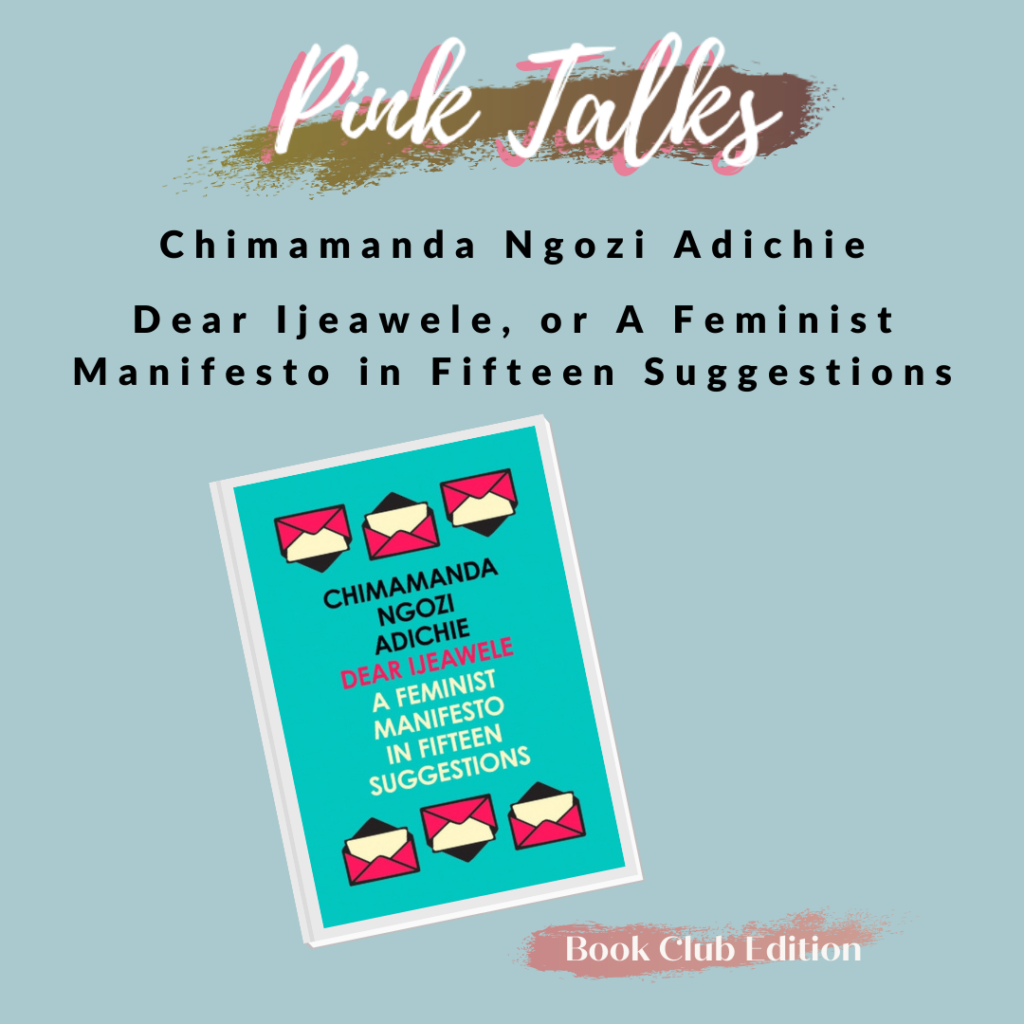Six years ago, on March 7, Chimamanda Ngozi Adichie published the epistolary manifesto titled Dear Ijeawele, or A Feminist Manifesto in Fifteen Suggestions. The book, along with its publication date, reminds us that women’s fight for basic human rights does not happen only in March. The validity of this book for today and from here on raises a flag depicting the need for all of us to take action. Remember the last episode about Adichie’s book We Should All Be Feminists? There, she concludes, “All of us, women and men, must do better.” We can empower women, but if we miss empowering and educating men, the road is only halfway.
Women: full human beings
The book, says Catarina, is like a “road map not only for young feminists but also to be used in girls’ and boys’ education on becoming feminists.” Born as a response to Ijeawele looking for feminist advice on raising her daughter, the text is built around education for both parents and children. To do that, we first have to recognize and awaken our minds from the patriarchy’s fences.
As a society, we don’t see mothers as whole persons with careers, plans, dreams, and ambitions outside of the mother role. Men act as full human beings without feeling divided into the father, husband, and son parts. The reason is we teach girls they have roles. We push them towards a one-way path of assuming the wife, mother, daughter, and sister ‘duties’. With boys, we give them more space, time, and freedom to explore. We label, put pressure on, and survey women on how they perform their roles. First, start on the individual level. Most of all, see yourself as a whole human. Then, teach others that women have to be recognized in society without labels.
Female clocks
Is marriage or a baby the only thing that measures a person? We got used to interfering in women’s choices to the point it almost became our second nature. Anyone could ask anything. To see it as a problem does not even cross our minds. Marriage and motherhood represent an achievement that overshadows the other aspects of life. It’s a mandatory accomplishment to aspire to.
We have three different titles for women, Miss, Ms., and Mrs., whose only purpose is to refer to her marital status, while for men, we use one form, Mr. They are connected to time and how time and marriage perception change with gender.
There is a double standard. Men are called super-dads for raising their children. Women usually become super-moms when they do too much work. Growing up, girls do the in-house chores, and boys do the outside chores if any at all. Putting children into boxes kills their creativity, curiosity, and potential of leaving the social norms. How many women and men are lost because of a childhood dominated by gender games, toys, play, roles, and expectations?
Words matter
Language is important. We saw what implications titles have and how questions like “When are you getting married/have children?” influence self-perception. One word we reflected upon was princess. Princess implies a sense of beauty, delicacy, role, and identity in relation to a prince. Being saved by the prince comes as a necessary or inevitable part of the story. The damsel in distress narrative device has been perpetuated by the cinema industry.
With her sixth suggestion, Adichie advises Ijeawele to teach her daughter to question language. “Language is the repository of our prejudices, our beliefs, our assumptions.” Language carries symbols, and the meaning of the words is too often disregarded. We can no longer hide behind ignorance and disguise our indifference into good intentions because words have consequences on a deeper and long-lasting level.
Empathy and books
Education is crucial. Whether you learn from school or books outside of school, develop deep thinking, critical skills, and most important, tolerance. Books are a way of discovering perspectives, states of being in the world and confronting our prejudgments. They train our empathy and respect toward others, listening abilities, and active participation. They help us build a sense of self and question and navigate today’s confusing world. If you have access to books and education, take advantage of the freedom, knowledge, autonomy, and experience you can gain.
Show resources

Adichie, Chimamanda Ngozi. (2017). Dear Ijeawele, or A Feminist Manifesto in Fifteen Suggestions. Knopf Publishers.
Amazon.com: Dear Ijeawele, or A Feminist Manifesto in Fifteen Suggestions
Adichie, Chimamanda Ngozi. (2014). We Should All Be Feminists. Fourth Estate.



